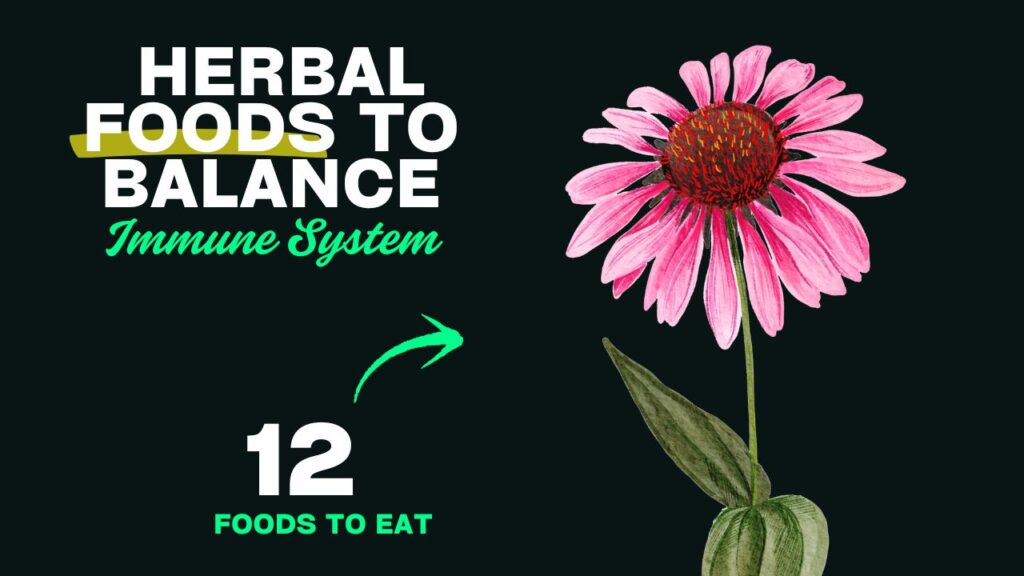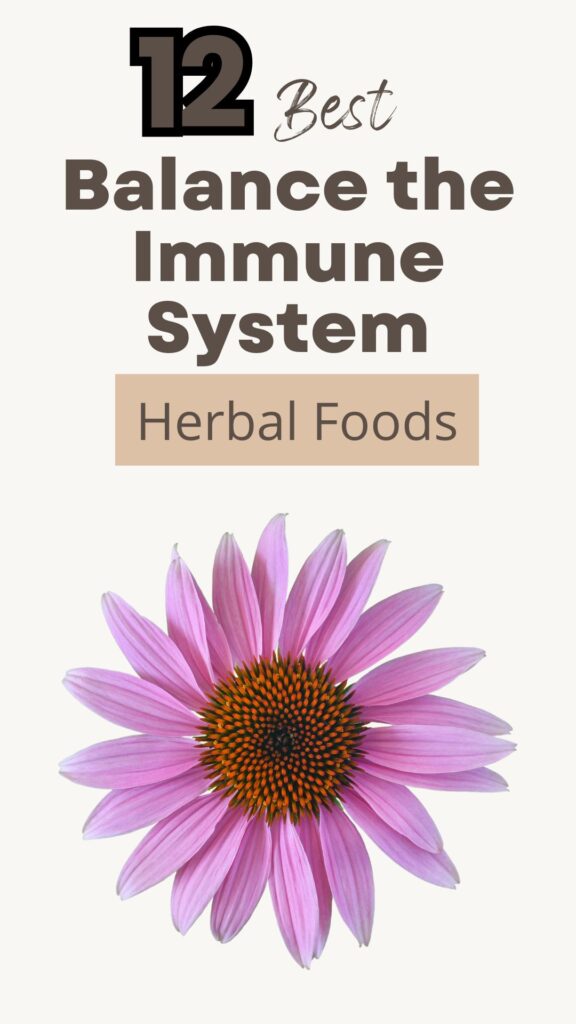Some links in this blog are affiliate links. If you make a purchase through these links, I may receive a small commission. This helps support the site at no extra cost to you.
Did you know that around 70% of your immune system lives in your gut? This means the food you eat directly impacts your ability to fight infections, recover from illness, and maintain energy levels.
While supplements and pills often get the spotlight, herbal foods—those time-tested plants used for centuries in traditional medicine—play a powerful role in strengthening immunity naturally.
From calming inflammation to supporting healthy white blood cells, these foods aren’t just old remedies; modern science now confirms their benefits.
Whether you’re fighting seasonal flu, coping with stress, or simply aiming for better overall health, including these herbal foods in your diet can be a game-changer.
In this guide, we’ll explore 12 immune-boosting herbal foods that help balance your body’s defense system. You’ll discover:
- Why each food is good for your immune health.
- The best ways to eat or use them for maximum benefits.
- Who should eat them (and who should avoid them).
- Buying and storage tips.
- Do’s and don’ts to get the most out of them.
- Possible side effects you should know about.
Let’s dive into the healing world of herbal foods.

Table of Contents

12 Best Herbal Foods That Balance Immunity
1. Garlic
Best Ways to Eat or Use It
- Raw for the strongest effect (chopped and left for 10 minutes before eating).
- Lightly cooked in soups, stews, or stir-fries.
- Added to honey for an immune-boosting syrup.
Who Should Eat / Avoid
- Good for: people prone to colds, those managing high blood pressure.
- Avoid if: you’re on blood-thinning medications or have stomach sensitivity.
Storage & Buying Tips
- Choose firm bulbs with no sprouts.
- Store in a cool, dry place (not in the fridge).
Do’s & Don’ts
| ✅ Do | ❌ Don’t |
|---|---|
| Crush before eating for more allicin. | Don’t microwave—it destroys compounds. |
| Use fresh garlic, not powder. | Don’t store peeled garlic for too long. |
Possible Side Effects
- Can cause stomach upset if eaten raw in large amounts.
2. Ginger
Best Ways to Eat or Use It
- Fresh ginger tea with lemon and honey.
- Added to stir-fries or smoothies.
- Powdered ginger in baking or soups.
Who Should Eat / Avoid
- Good for: people with weak digestion, frequent sore throats.
- Avoid if: you’re pregnant in large doses or on blood-thinners.
Storage & Buying Tips
- Pick firm roots with smooth skin.
- Refrigerate in a paper towel for longer freshness.
Do’s & Don’ts
| ✅ Do | ❌ Don’t |
|---|---|
| Use fresh ginger for stronger effects. | Don’t consume over 4g daily. |
| Make tea with crushed ginger. | Don’t rely only on powdered ginger for benefits. |
Possible Side Effects
- May cause heartburn or mild diarrhea in excess.
3. Turmeric
Best Ways to Eat or Use It
- Golden milk (turmeric latte).
- Added to curries, soups, or rice.
- Combine with black pepper for better absorption.
Who Should Eat / Avoid
- Good for: people with joint pain, inflammation, or weak immunity.
- Avoid if: you have gallstones or take blood-thinning drugs.
Storage & Buying Tips
- Choose fresh turmeric root when possible.
- Store ground turmeric in airtight jars away from sunlight.
Do’s & Don’ts
| ✅ Do | ❌ Don’t |
|---|---|
| Add black pepper to enhance curcumin absorption. | Don’t overuse—it may cause digestive upset. |
| Use with healthy fats like ghee or olive oil. | Don’t consume on an empty stomach in large amounts. |
Possible Side Effects
- High doses may cause nausea or interact with medications.
4. Holy Basil (Tulsi)
Best Ways to Eat or Use It
- Brewed as tea with honey.
- Added fresh to salads or soups.
Who Should Eat / Avoid
- Good for: people with stress-related immune weakness.
- Avoid if: you’re pregnant without doctor’s advice.
Storage & Buying Tips
- Use fresh leaves when possible.
- Store dried tulsi in airtight containers.
Do’s & Don’ts
| ✅ Do | ❌ Don’t |
|---|---|
| Drink tulsi tea daily for balance. | Don’t over-consume if on fertility treatments. |
| Combine with ginger for immunity. | Don’t expose leaves to moisture. |
Possible Side Effects
- Rare, but excessive use may affect fertility.
5. Ginseng
Best Ways to Eat or Use It
- Ginseng tea.
- Added to soups.
- Powder in smoothies.
Who Should Eat / Avoid
- Good for: people with fatigue, low immunity.
- Avoid if: you have high blood pressure or insomnia.
Storage & Buying Tips
- Buy from trusted herbal suppliers.
- Store dried ginseng in glass jars.
Do’s & Don’ts
| ✅ Do | ❌ Don’t |
|---|---|
| Use small amounts daily. | Don’t combine with too much caffeine. |
| Rotate with other herbs. | Don’t use for more than 3 months straight. |
Possible Side Effects
- Can cause headaches or sleep problems if overused.
6. Echinacea
Best Ways to Eat or Use It
- Herbal teas.
- Tinctures and capsules.
Who Should Eat / Avoid
- Good for: those prone to frequent colds.
- Avoid if: you have autoimmune disorders.
Storage & Buying Tips
- Dried echinacea should be stored in airtight jars.
- Buy organic to avoid chemical residues.
Do’s & Don’ts
| ✅ Do | ❌ Don’t |
|---|---|
| Take during early cold symptoms. | Don’t take daily year-round. |
| Rotate with other herbal teas. | Don’t exceed recommended dose. |
Possible Side Effects
- Rare allergic reactions in sensitive individuals.
7. Oregano
Best Ways to Eat or Use It
- Fresh leaves in salads or pasta.
- Oregano oil in small diluted doses.
- Herbal tea for sore throat.
Who Should Eat / Avoid
- Good for: respiratory issues, gut health.
- Avoid if: pregnant (oil form), or sensitive to strong herbs.
Storage & Buying Tips
- Fresh oregano should be kept in damp paper towel in fridge.
- Dried oregano keeps well in airtight jars.
Do’s & Don’ts
| ✅ Do | ❌ Don’t |
|---|---|
| Use fresh leaves for stronger antioxidants. | Don’t take oregano oil undiluted. |
| Add at the end of cooking to preserve flavor. | Don’t consume in very high doses. |
Possible Side Effects
- Strong oil may irritate the stomach if not diluted.
8. Cinnamon
Best Ways to Eat or Use It
- Added to teas, smoothies, oatmeal.
- Sprinkle on fruits or baked goods.
Who Should Eat / Avoid
- Good for: people with blood sugar issues.
- Avoid if: you have liver problems (cassia cinnamon in excess).
Storage & Buying Tips
- Choose Ceylon cinnamon (“true cinnamon”) for health benefits.
- Store sticks or powder in airtight jars.
Do’s & Don’ts
| ✅ Do | ❌ Don’t |
|---|---|
| Use Ceylon variety for daily use. | Don’t overconsume cassia cinnamon. |
| Pair with honey for coughs. | Don’t leave powder exposed to air. |
Possible Side Effects
- Too much cassia cinnamon can affect liver function.
9. Rosemary
Best Ways to Eat or Use It
- Fresh sprigs in soups, baked dishes.
- Rosemary tea.
- Infused oils.
Who Should Eat / Avoid
- Good for: memory, circulation, immunity.
- Avoid if: pregnant in large amounts.
Storage & Buying Tips
- Wrap fresh sprigs in damp paper towel in fridge.
- Dry leaves store well in airtight jars.
Do’s & Don’ts
| ✅ Do | ❌ Don’t |
|---|---|
| Use fresh sprigs for stronger flavor. | Don’t consume rosemary oil internally. |
| Pair with garlic for extra immunity. | Don’t expose dried leaves to sunlight. |
Possible Side Effects
- Large doses may cause stomach upset.
10. Thyme
Best Ways to Eat or Use It
- Thyme tea for coughs.
- Fresh leaves in soups and roasts.
Who Should Eat / Avoid
- Good for: respiratory infections.
- Avoid if: pregnant in concentrated oil form.
Storage & Buying Tips
- Fresh thyme lasts longer if wrapped in paper towel in fridge.
- Dried thyme is best kept in dark jars.
Do’s & Don’ts
| ✅ Do | ❌ Don’t |
|---|---|
| Use fresh thyme for stronger antioxidants. | Don’t take thyme oil undiluted. |
| Add to honey for sore throats. | Don’t overcook—it loses flavor. |
Possible Side Effects
- Thyme oil may irritate skin or stomach if not diluted.
11. Sage
Best Ways to Eat or Use It
- Sage tea.
- Fresh leaves in roasts or sauces.
Who Should Eat / Avoid
- Good for: sore throats, digestive health.
- Avoid if: pregnant or breastfeeding in large doses.
Storage & Buying Tips
- Fresh sage lasts in fridge wrapped in cloth.
- Dried sage should be airtight.
Do’s & Don’ts
| ✅ Do | ❌ Don’t |
|---|---|
| Use sage tea for colds. | Don’t use sage essential oil internally. |
| Cook gently to preserve flavor. | Don’t use wilted leaves. |
Possible Side Effects
- Excess may cause nausea or dizziness.
12. Green Tea (Herbal Form)
Best Ways to Eat or Use It
- Brewed fresh (don’t over-steep).
- Matcha for stronger antioxidants.
Who Should Eat / Avoid
- Good for: people with fatigue, weak immunity.
- Avoid if: sensitive to caffeine.
Storage & Buying Tips
- Store tea leaves in airtight tins.
- Avoid exposure to moisture and sunlight.
Do’s & Don’ts
| ✅ Do | ❌ Don’t |
|---|---|
| Brew for 2–3 minutes only. | Don’t re-boil leaves repeatedly. |
| Add lemon for vitamin C boost. | Don’t drink too close to bedtime. |
Possible Side Effects
- Excess caffeine can cause jitteriness.
Conclusion
Balancing your immune system doesn’t require expensive supplements or harsh treatments. Nature already provides a pharmacy through herbal foods that have been trusted for centuries and validated by modern research.
From the potent allicin in garlic to the soothing power of tulsi, each of these foods helps your body defend itself, recover faster, and stay energized. By choosing fresh, storing properly, and eating them the right way, you can make them part of your daily lifestyle.
Why not try adding garlic to tonight’s meal, or sipping on a cup of tulsi tea tomorrow morning? Small, consistent choices create lasting health changes.
Now it’s your turn—Which of these immune-boosting herbal foods do you already use, and which one are you excited to try? Share your favorite recipe or tip in the comments!
Frequently Asked Questions (FAQs)
Can herbal foods really strengthen the immune system?
Yes. Many herbal foods like garlic, turmeric, and ginger contain natural compounds that enhance white blood cell activity, reduce inflammation, and help the body fight infections more effectively.
How often should I eat these herbal foods for benefits?
Most herbal foods can be safely included in daily meals in moderate amounts. However, concentrated forms like oils, teas, or supplements should be consumed in recommended doses only.
Are there any side effects of eating too many herbal foods?
Yes. Overconsumption may cause stomach upset, allergic reactions, or interact with medications (e.g., garlic with blood thinners, turmeric with gallbladder issues). Always consume in moderation.
Can pregnant women eat immune-boosting herbs?
Some herbs like ginger and garlic are generally safe in food amounts, but concentrated herbs (like sage oil, oregano oil, or ginseng) may not be suitable. Pregnant women should consult a healthcare professional before adding them.
Do I need to eat all 12 herbal foods to balance my immune system?
Not at all. Even including a few of them regularly—like garlic, turmeric, or green tea—can make a noticeable difference in your immunity.
Is it better to use fresh or dried herbs?
Fresh herbs usually contain more active compounds and stronger flavors, but dried herbs are convenient and still beneficial if stored properly.
Can children also eat these herbal foods?
Yes, but in small, age-appropriate amounts. For example, ginger tea or turmeric milk is safe for kids, but strong herbal oils should be avoided.
How long does it take to see results from these herbal foods?
Immunity improves gradually with consistent use. Unlike supplements, herbal foods support long-term health, so you may notice fewer colds and more energy over weeks to months.
Can I combine these herbs together in meals?
Absolutely! Combining herbs like garlic, ginger, and turmeric in soups or teas often enhances their immune-boosting effects.
Should I replace my medicines with herbal foods?
No. Herbal foods are a supportive measure for immunity, not a replacement for prescribed medical treatments. Always follow your doctor’s advice.










